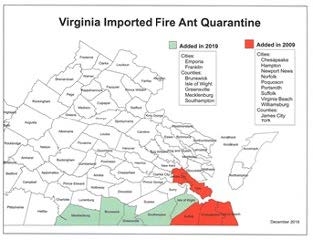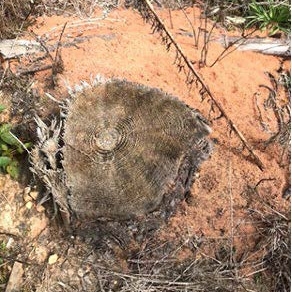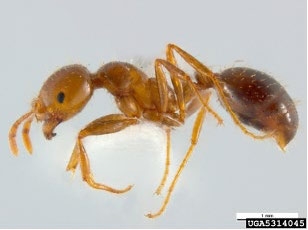Red Imported Fire Ant Logger Self-Inspection Checklist
ID
ENTO-492NP
Don't move fire ants! Before moving logs and equipment out of areas near Red Imported Fire Ant infestations, use this checklist with your vehicles, equipment, and products.
The Red Imported Fire Ant (RIFA) is an invasive insect. These ants are extremely aggressive, red to brown in color, and have two segments on the waist and a stinger on the end of the body. RIFAs were found in Hampton, Virginia in 1989 and by 2022 have spread to 25 counties and cities, 18 of which are under quarantine (see map below). RIFA is found in loose, uncompacted soil in places like cutovers, edges of wooded areas, logging roads, and parking areas for trucks and equipment. Soil picked up by skidders, truck landing gear, and earth moving equipment can harbor and move RIFAs. The quarantine for RIFA means movement of these pests and equipment that can harbor them is regulated in Virginia. Loggers may enter into a compliance agreement with Virginia Department of Agriculture and Consumer Services (VDACS) agreeing to self-inspection and soil removal from logs and vehicles leaving the quarantined area.
Self - Inspection Checklist for Loggers and Logging Companies
Date Logging site inspector
Keep copies of this sheet in vehicles used in fire ant infested locations.
Before loading logs and moving equipment from one site to another, check for loose uncompacted soil that may harbor fire ants on:
Logging equipment (e.g. skidders, loaders, bulldozers, trailers)
Cut logs and stumps with roots that are being moved
Before leaving a logging site check for soil and fire ants on:
Earth moving equipment
Trailer landing gear
Outriggers on equipment
Wheel wells and suspension of vehicles
Check equipment that has been stored outside for a long period of time.
Trailers
Portable buildings
Electrical junction boxes
Fuel tanks
If you find fire ants:
Sweep them off with a broom.
Power wash them off equipment (this step may be already taken if you clean properly when moving equipment from job to job).
Contact your local Forester or Extension Agent for more information.
Report them to VDACS if outside of the quarantine area.



Figures from top: VDACS RIFA quarantine map, https://www.vdacs.virginia.gov/pdf/fire- ant-quar-map.pdf; Fire ant mound next to stump, photo by Eric Day; RIFA adult, Pest and Diseases Image Library, Bugwood.
The Red Imported Fire Ant (RIFA) is an invasive insect. RIFA is found in loose, uncompacted soil in places like cutovers, edges of wooded areas, logging roads, and parking areas for trucks and equipment. Soil picked up by skidders, truck landing gear, and earth moving equipment can harbor and move RIFAs. The quarantine for RIFA means movement of these pests and equipment that can harbor them is regulated in Virginia.
Virginia Cooperative Extension materials are available for public use, reprint, or citation without further permission, provided the use includes credit to the author and to Virginia Cooperative Extension, Virginia Tech, and Virginia State University.
Virginia Cooperative Extension is a partnership of Virginia Tech, Virginia State University, the U.S. Department of Agriculture (USDA), and local governments, and is an equal opportunity employer. For the full non-discrimination statement, please visit ext.vt.edu/accessibility.
Publication Date
February 25, 2022



